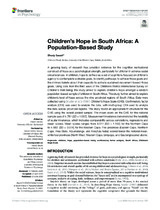| dc.contributor.author | Savahl, Shazly | |
| dc.date.accessioned | 2020-10-19T08:18:52Z | |
| dc.date.available | 2020-10-19T08:18:52Z | |
| dc.date.issued | 2020 | |
| dc.identifier.citation | Savahl, S . (2020). Children’s hope in South Africa: A population-based Study. Frontiers in Psychology. 11,10-23: 10.3389/fpsyg.2020.01023 | en_US |
| dc.identifier.issn | 1664-1078 | |
| dc.identifier.uri | http://hdl.handle.net/10566/5275 | |
| dc.description.abstract | A growing body of research has provided evidence for the cognitive motivational construct of hope as a psychological strength, particularly for children in adverse social circumstances. In children, hope is defined as a set of cognitions focused on children’s agency to contemplate workable goals, to identify pathways to achieve those goals and the intrinsic beliefs about their capacity to activate sustained movement toward those goals. Using data from the third wave of the Children’s Worlds International Survey on Children’s Well-Being, the study aimed to explore children’s hope amongst a random population-based sample of children in South Africa. The study further aimed to explore children’s level of hope across the nine provincial regions of South Africa. | en_US |
| dc.language.iso | en | en_US |
| dc.publisher | Frontiers Media S.A. | en_US |
| dc.subject | Children | en_US |
| dc.subject | South Africa | en_US |
| dc.subject | Children’s Hope Scale | en_US |
| dc.subject | Population-based study | en_US |
| dc.subject | Confirmatory factor analysis | en_US |
| dc.title | Children’s hope in South Africa: A population-based Study | en_US |
| dc.type | Article | en_US |

